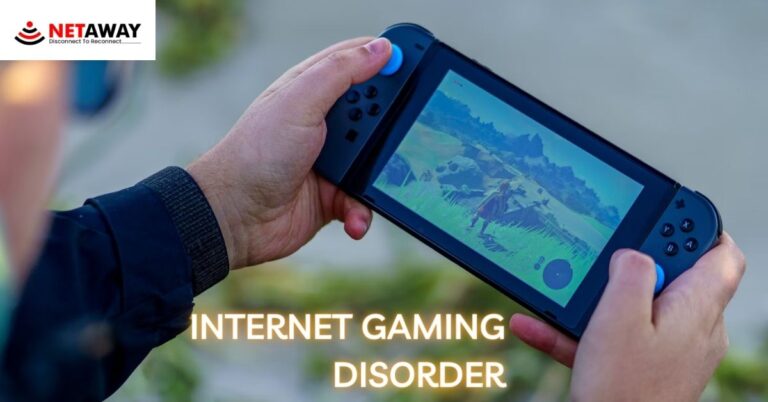
Online gaming has become a world’s worldwide phenomenon, it attracts millions of players from all walks of life. Gaming can be a source of entertainment, relaxation, and even social interaction, it has also given rise to a phenomenon known as Internet Gaming Disorder(IGD)IGD is characterized by excessive and obsessive gaming behaviours, resulting in negative outcomes in a person’s life, such as impaired academic or work performance, strained relationships, and emotional distress.
Understanding Internet Gaming Disorder
Internet Gaming Disorder is not a mere preference for gaming; it represents a compulsive and problematic pattern of behavior. The American Psychiatric Association (APA) included IGD in the fifth edition of the Diagnostic and Statistical Manual of Mental Disorders (DSM-5) as a condition warranting further research. While IGD is not yet officially classified as a mental disorder, its recognition underscores the seriousness of the issue.

Symptoms of Internet Gaming Disorder
To better understand IGD, let’s explore some common symptoms and signs:
Preoccupation with Gaming: Constantly thinking about gaming, even when not playing, and feeling an intense urge to return to the game.
Loss of Control: Inability to control the amount of gaming time, often exceeding initially intended durations.
Neglecting Priorities: Neglecting responsibilities, such as school, work, or family obligations, in favor of gaming.
Escapism: Using gaming as a way to escape from real-life problems, stress, or emotional challenges.
Withdrawal Symptoms: Feeling restless, irritable, or anxious when unable to play, similar to withdrawal symptoms in substance addiction.
Tolerance: Needing to play for longer periods or with more intensity to achieve the same level of excitement.
Neglecting Self-Care: Skipping meals, losing sleep, or forgoing exercise and hygiene due to excessive gaming.
Conflict in Relationships: Experiencing disputes with family, friends, or partners over the amount of time spent gaming.
Deceptive Behavior: Lying about the amount of time spent gaming or trying to conceal the extent of the problem.
Impact of Internet Gaming Disorder
The consequences of Internet Gaming Disorder can be profound and far-reaching:
Academic and Occupational Impairment: IGD can lead to declining academic or job performance, potentially jeopardizing one’s future prospects.
Strained Relationships: Excessive gaming can strain relationships with family and friends, leading to feelings of isolation and loneliness.
Physical Health Issues: Long gaming sessions can result in physical health problems like obesity, sleep disturbances, and eyestrain.
Mental Health Concerns: IGD is often associated with depression, anxiety, and increased stress levels.
Financial Problems: In some cases, individuals may spend exorbitant amounts of money on in-game purchases or gaming equipment, leading to financial hardship.
Social Isolation: Excessive gaming can lead to social isolation, as individuals may prioritize gaming over face-to-face interactions.
Why is “online gaming addiction” a problem in your family?
Excessive gaming can lead to neglect of family obligations, causing conflicts and strained connections, it badly impacts relationships and responsibilities with one’s family
It may isolate individuals from family members as they prioritize virtual worlds over real-life interactions.
Moreover, addiction can harm mental and physical health, affecting the entire family’s dynamics.
Factors Contributing to Internet Gaming Disorder
IGD can develop for various reasons, and several factors may contribute to its onset:
Escapism: Gaming can offer an escape from real-life stressors or emotional challenges, making it an appealing coping mechanism.
Peer Pressure: Peer influence and the desire to fit in with a gaming community can lead to excessive gaming.
Easy Accessibility: The widespread availability of high-speed internet and gaming devices makes gaming incredibly accessible.
Reward Mechanisms: Games often employ reward mechanisms, such as leveling up or earning virtual rewards, which can trigger dopamine release, reinforcing addictive behavior.
Lack of Alternative Activities: A lack of engaging offline activities or hobbies can make gaming the default form of entertainment.
Strategies for Regaining Control
Recognizing and addressing IGD is essential for those who feel they may be struggling. Here are strategies to help regain control:
Self-Assessment: Reflect on your gaming habits honestly. Are they interfering with your responsibilities and well-being?
Set Limits: Establish clear boundaries for gaming time. Stick to a schedule that allows for other important activities.
Alternate Activities: Engage in offline activities that you enjoy, such as sports, art, or reading, to divert your attention from gaming.
Seek Support: Reach out to friends, family, or a therapist for support and understanding. Discussing your concerns with loved ones can be incredibly helpful.
Therapy: Consider therapy, such as cognitive-behavioral therapy (CBT), which can address the underlying causes of addiction and provide coping strategies.
Support Groups: Joining support groups or online communities for individuals dealing with gaming addiction can offer valuable insights and encouragement.
Parental Involvement: Parents should actively monitor their children’s gaming habits and set reasonable limits.
Accountability Partners: Having an accountability partner, whether a friend or family member, can help you stay on track and avoid excessive gaming.
Uninstall or Restrict Access: Temporarily uninstall games or use parental control software to restrict access during specified times.
Professional Help: In severe cases, seeking professional help from addiction specialists or therapists experienced in gaming addiction is crucial.
so, Internet Gaming Disorder is a complex issue that affects many individuals, especially students. Recognizing the signs and consequences of IGD is the first step toward addressing the problem. Remember that overcoming IGD is a journey, and with determination and the right support, it is possible to find a fulfilling life beyond the screen.
